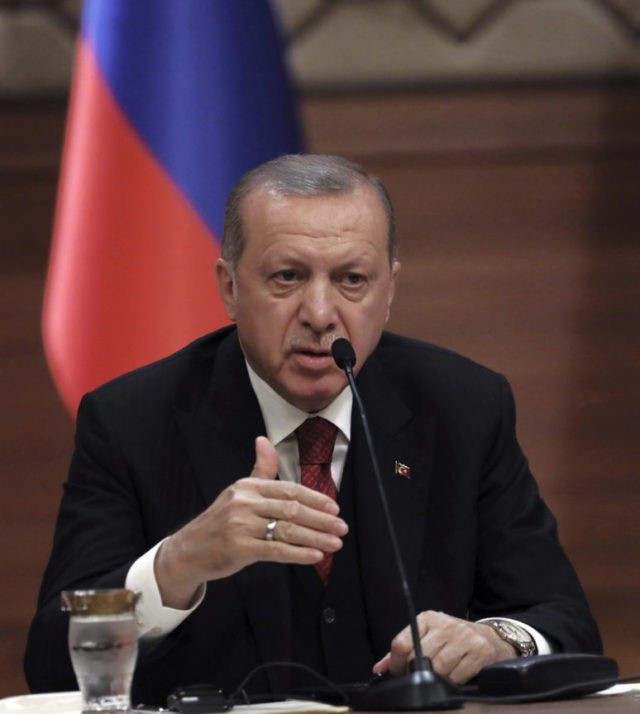Turkish President Recep Tayyip Erdogan refuted remarks by Russian Foreign Minister Sergei Lavrov that the world expects Turkey to hand northern Afrin, Syria, to the Assad regime as soon as possible, replying Tuesday that the affairs of the Turkish military are “up to us, not to Mr. Lavrov.”
Erdogan’s harsh comments expose yet more cracks in the surface of Turkey’s tenuous diplomatic relationship with Russia, largely built on mutual distaste for America’s presence in the region but significantly threated by Russia’s close ties to Syrian dictator Bashar al-Assad, who Erdogan has repeatedly referred to as a terrorist.
Erdogan launched “Operation Olive Branch,” a ground invasion of Afrin, in January to confront the increasingly stable presence of Kurdish fighters there. The Turkish government considers the U.S.-allied Kurdish People’s Protection Units (YPG/YPJ) indistinguishable from the Kurdistan Workers’ Party (PKK), a U.S.-designated Marxist terrorist group. Erdogan insisted the invasion of Afrin was necessary to keep “terrorists” away from the Turkish border.
The YPG, abandoned by their U.S. allies, withdrew from Afrin east towards Manbij, where a U.S. ground presence remains. Erdogan has repeatedly warned that Turkish troops would enter Manbij if necessary to dislodge the Kurds.
The Russian government is now pressuring Turkey to hand Afrin – located in Rojava, or Syrian Kurdistan – to the Assad regime.
“This is a wrong approach. We know very well to whom we will return Afrin,” Erdogan told lawmakers in the Turkish parliament on Tuesday. “We will determine the time. That is up to us, not to Mr. Lavrov.”
On Monday, Lavrov implied that Turkey had already agreed to hand over Afrin to Assad forces.
“President Erdogan never stated that Turkey intended to occupy Afrin,” Lavrov said. “We assume that the simplest way of normalization in Afrin, now, when Turkish representatives say they have reached the fundamental purposes there [in Afrin], is to return the territory of Afrin under control of the Syrian government.”
In the same parliamentary address, Erdogan also addressed the alleged chemical weapons attack on civilians in Douma, Eastern Ghouta, a rebel-held suburb of Damascus. The attack reportedly left nearly 50 dead and an untold number of others severely wounded.
“I curse those who carried out this massacre. Whoever has done this, the perpetrators will be brought to account and certainly pay a heavy price,” Erdogan said, vowing direct talks with Russian President Vladimir Putin on the matter but not blaming the Assad regime for the attack. “Talks will continue today and tomorrow,” the Turkish president promised.
President Donald Trump called the Douma attack “atrocious” and vowed a swift U.S. response against the perpetrators, believed to be Assad’s forces. “If it’s the Russians, if it’s Syria, if it’s Iran, if it’s all of them together, we’ll figure it out,” Trump promised.
Erdogan insisted that the Turkish military had “neutralized” (killed or captured) over 4,000 “terrorists” in Afrin, largely referring to Kurdish fighters and allies.
Turkey recently joined multilateral talks with Russia and Iran on how best to protect civilians in the Syrian civil war. Erdogan met Putin and Iranian President Hassan Rouhani last week in Ankara, where all agreed to fight “terrorism” without clearly defining which active militias in Syria constitute terrorists and which do not.
At the meeting, Rouhani demanded Erdogan hand over Afrin to the Assad regime. Reports from February indicated that Russian officials had similarly pressured the YPG in Afrin before Erdogan attacked, suggesting they hand over the territory to Assad so that Syrian national troops could protect them from Erdogan.
“One day before the attack of Turkey, Russia with the [Assad] regime, they have a dialogue with our leaders there [Afrin], and they asked them to hand over Afrin to the regime so that they can take it back and after that, they can protect it, defend it,” a representative for the Democratic Federation of Northern Syria (the Kurdish government) in Rojava said at the time.
Prior to the trilateral Ankara talks, Erdogan and Putin met for a joint public appearance to celebrate the groundbreaking at Turkey’s first planned nuclear power plant, the Akkuyu Nuclear Power Plant, which Russia will build at the cost of $22 billion.
Russia and Iran are Assad’s most powerful allies. Iran, in particular, has invested heavily in its proxy militias in Syria to help Assad maintain power throughout the civil war.

COMMENTS
Please let us know if you're having issues with commenting.